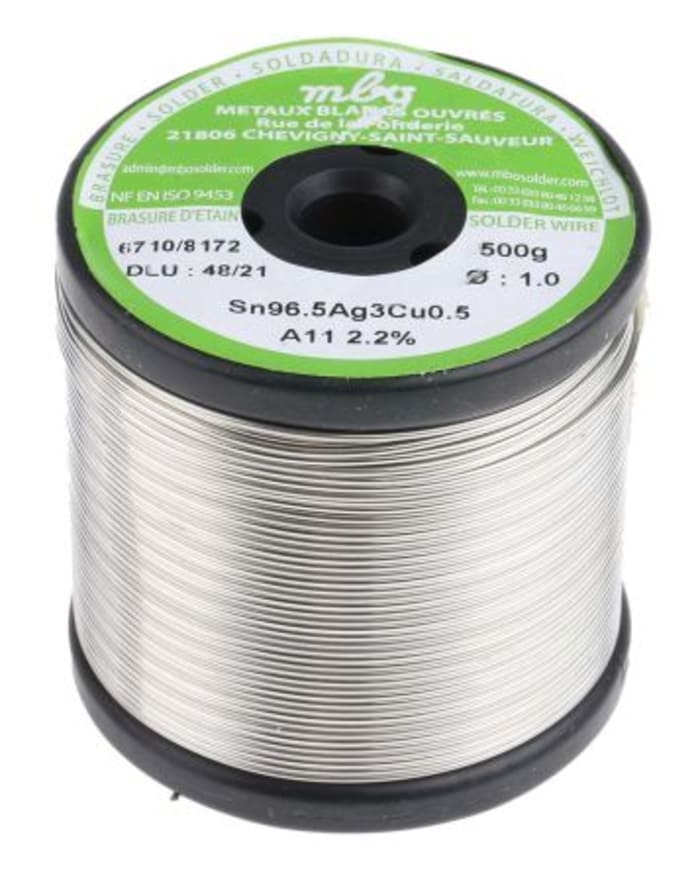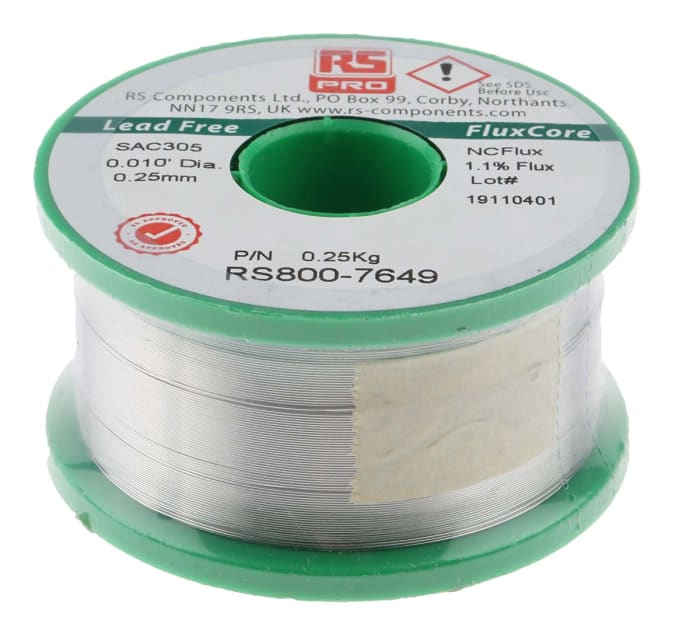Teknik Belgeler
Özellikler
Marka
RS ProTel Çapı
1.01mm
Model Numarası
SAC305 NC600
Kurşun Yüzdesi
0%
Ürün Formu
Tel
Erime Noktası
217°C
Gümüş Yüzdesi
3%
Kalay Yüzdesi
96.5%
Flux Tipi
Reçine Tabanlı
Ürün Ağırlığı
500g
Flux İçeriği Yüzdesi
2.2%
Bakır Yüzdesi
0.5%
Ürün Ayrıntıları
RS PRO Lead-Free Solder Wire
From teh trusted RS PRO brand, this lead-free solder wire from RS is a resin-based SAC305 solder wire. SAC305 is a specially-formulated lead-free alloy that contains 96.5% tin, 3% silver and 0.5% copper. SAC305 alloy comes under the JEIDA recommendation for lead-free solder, conforming to J-STD 006.
The solder wire flux is specifically formulated to wet common Printed Circuit Boards (PCB) and components. The residue left after soldering is completely clear and is safe to leave on the PCB post soldering.
Features and Benefits
• Multipurpose solder wire that can be used for a variety of soldering tasks
• Suitable for soldering all products that must be RoHS compliant
• Melting point between 217-219°C
• Flux content 3.3%
• Soldering tip typical temperature for use with this solder wire is 360-400°C
Applications
Solder is used alongside soldering irons, particularly in securing electrical components to integrated circuit boards. The solder melts easily when heated, and cools quickly, meaning it can be moulded to secure components in place in solder joints. The quick setting nature of solder means it can also be used for light brazing.
Because of its relatively low melting point, solder can be reworked easily by heating it to melting point and using a solder sucker to remove it.
Solder is commonly used with SMD and through-hole components, with applications in repair, prototyping and production.
What are the differences between lead-free solder and leaded solder?
Lead-free solder is generally regarded as having a more positive environmental impact than leaded solder, and also as being safer for human use. However, lead-free solder also has potential production advantages. Lead-free solder can offer better lead spacing, which makes it more suitable for high-density components where pitches are tight. This means potentially better performance where space saving is a concern.
The advantages of lead solder are that it has a lower melting point, which is sometimes preferable for hand working components. Also, lower working temperatures reduces the risk of damage to components and circuit board.
Unlike lead-free solder, lead solder does not have a shelf-life and is less prone to losing quality after prolonged exposure to oxygen. However, many electronic application requirements exclude the use of lead solder, due to the toxicity of lead.
Why RS PRO?
RS PRO aims to be your go-to brand for reliability and value for money. We source great parts at great prices and test everything with our in-house experts to ensure the quality you need.
When it comes to tools, we know that versatility and dependability are what you need. As such, we stock a variety of mainstay and specialist tools to suit any application. Whether you're a professional electrician, technician, engineer or home inventor, RS PRO is here to support you.
Standards
Flux classification per J-STD 004 is ROL0 - leaves a highly reliable post-soldering residue.



Teklif İsteyiniz
1
Teklif İsteyiniz
Stok bilgileri geçici olarak kullanılamıyor.
1
Stok bilgileri geçici olarak kullanılamıyor.



Teknik Belgeler
Özellikler
Marka
RS ProTel Çapı
1.01mm
Model Numarası
SAC305 NC600
Kurşun Yüzdesi
0%
Ürün Formu
Tel
Erime Noktası
217°C
Gümüş Yüzdesi
3%
Kalay Yüzdesi
96.5%
Flux Tipi
Reçine Tabanlı
Ürün Ağırlığı
500g
Flux İçeriği Yüzdesi
2.2%
Bakır Yüzdesi
0.5%
Ürün Ayrıntıları
RS PRO Lead-Free Solder Wire
From teh trusted RS PRO brand, this lead-free solder wire from RS is a resin-based SAC305 solder wire. SAC305 is a specially-formulated lead-free alloy that contains 96.5% tin, 3% silver and 0.5% copper. SAC305 alloy comes under the JEIDA recommendation for lead-free solder, conforming to J-STD 006.
The solder wire flux is specifically formulated to wet common Printed Circuit Boards (PCB) and components. The residue left after soldering is completely clear and is safe to leave on the PCB post soldering.
Features and Benefits
• Multipurpose solder wire that can be used for a variety of soldering tasks
• Suitable for soldering all products that must be RoHS compliant
• Melting point between 217-219°C
• Flux content 3.3%
• Soldering tip typical temperature for use with this solder wire is 360-400°C
Applications
Solder is used alongside soldering irons, particularly in securing electrical components to integrated circuit boards. The solder melts easily when heated, and cools quickly, meaning it can be moulded to secure components in place in solder joints. The quick setting nature of solder means it can also be used for light brazing.
Because of its relatively low melting point, solder can be reworked easily by heating it to melting point and using a solder sucker to remove it.
Solder is commonly used with SMD and through-hole components, with applications in repair, prototyping and production.
What are the differences between lead-free solder and leaded solder?
Lead-free solder is generally regarded as having a more positive environmental impact than leaded solder, and also as being safer for human use. However, lead-free solder also has potential production advantages. Lead-free solder can offer better lead spacing, which makes it more suitable for high-density components where pitches are tight. This means potentially better performance where space saving is a concern.
The advantages of lead solder are that it has a lower melting point, which is sometimes preferable for hand working components. Also, lower working temperatures reduces the risk of damage to components and circuit board.
Unlike lead-free solder, lead solder does not have a shelf-life and is less prone to losing quality after prolonged exposure to oxygen. However, many electronic application requirements exclude the use of lead solder, due to the toxicity of lead.
Why RS PRO?
RS PRO aims to be your go-to brand for reliability and value for money. We source great parts at great prices and test everything with our in-house experts to ensure the quality you need.
When it comes to tools, we know that versatility and dependability are what you need. As such, we stock a variety of mainstay and specialist tools to suit any application. Whether you're a professional electrician, technician, engineer or home inventor, RS PRO is here to support you.
Standards
Flux classification per J-STD 004 is ROL0 - leaves a highly reliable post-soldering residue.



